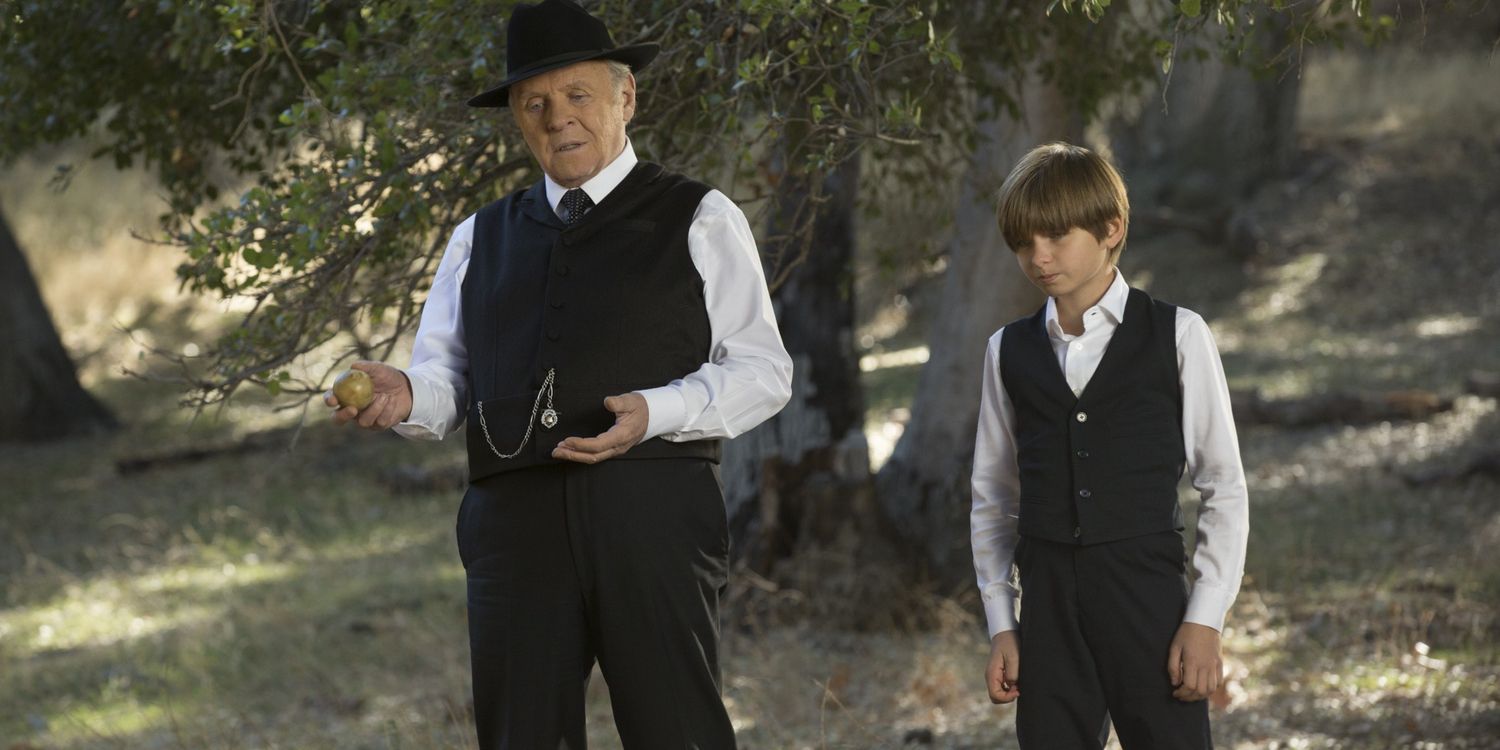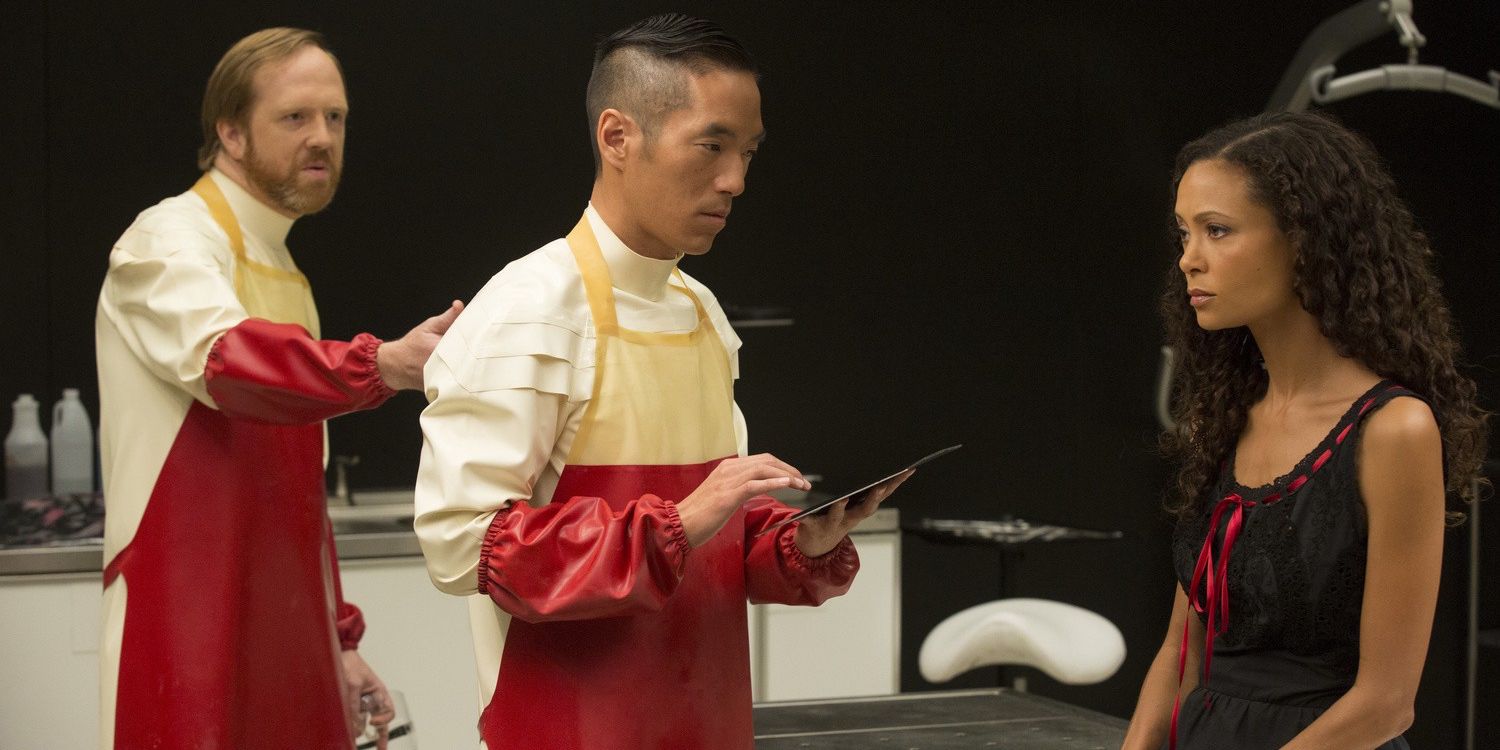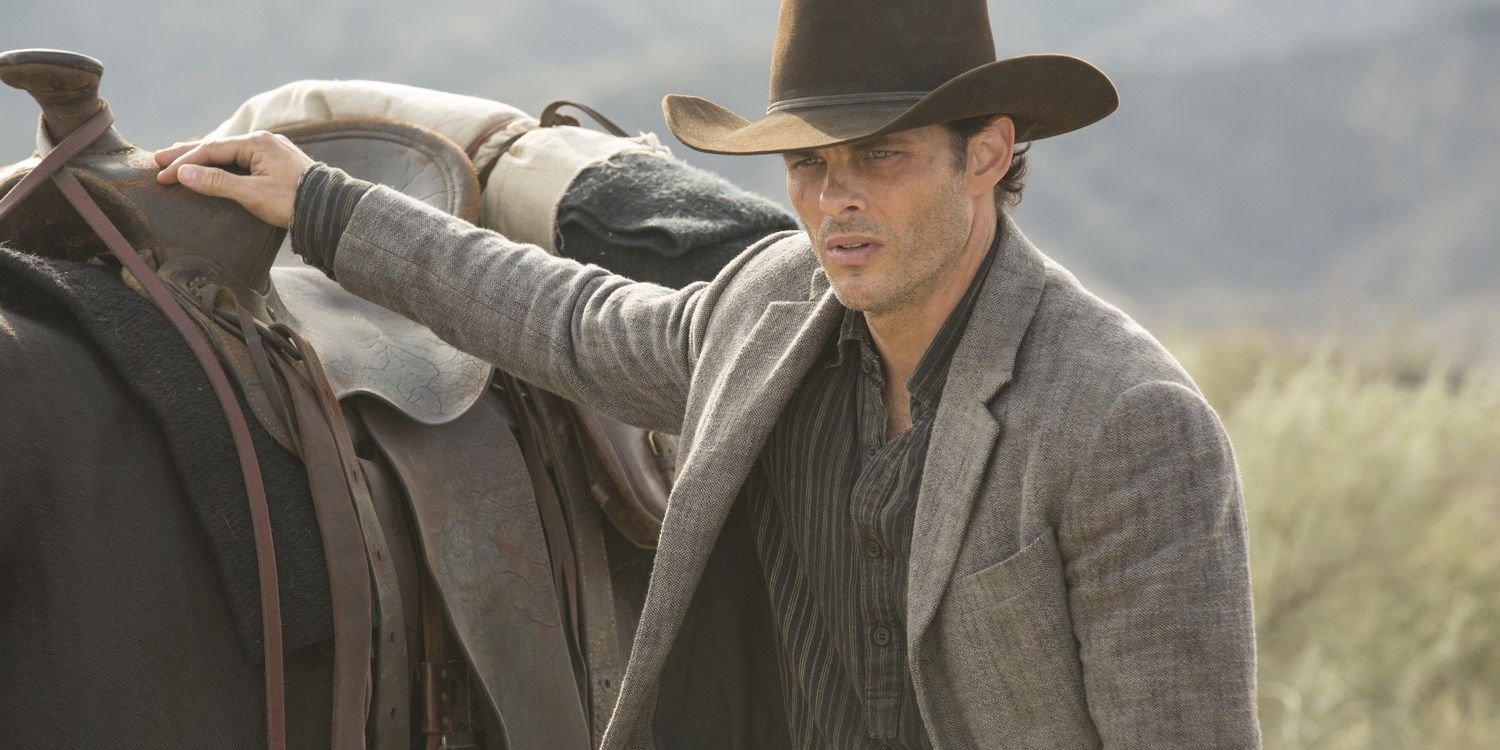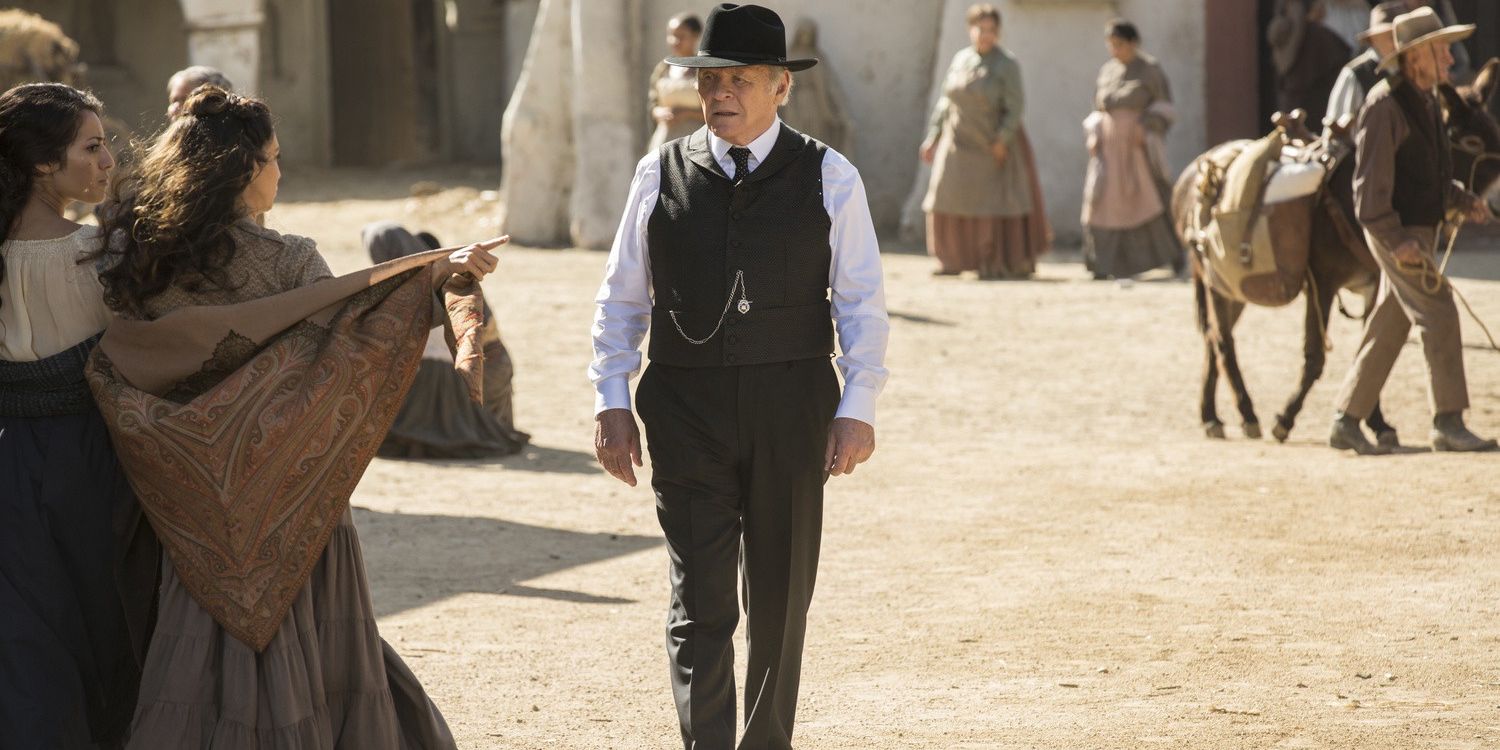[This article contains SPOILERS for the Westworld episode 'The Adversary.]
-
Despite appearances to the contrary, HBO's Westworld isn't just a puzzle-box machine stimulating day-after thinkpieces or Reddit-thread speculation; it also has the makings of a pretty solid workplace drama. To that end, the season's sixth episode represents a small change of pace that aims to unpackage the workplace drama from of the puzzle box, and let it run simultaneously with all the bits still encouraging the rampant theorizing that has (for better or worse) become such an integral part of watching the show. But 'The Adversary' also garners interest in that it manages to fold many of those workplace dynamics into the larger narrative and use them to help guide many of the characters toward the same place.
With a cast as sizeable as the one Westworld has, it is to the show's advantage to assign narrative importance to a series of power couples. The need has become increasingly important in the second half of the season, as the show has demonstrated a willingness to focus on progressing the narrative and to loosen its grip on a few of the many mysteries floating around since the series premiered. These power couples not only afford the opportunity to advance the plot and to dole out some exposition at times, but they also give the show a chance to establish a rapport between individuals, to develop them as characters and as human beings – well, inasmuch as all of them are actually human beings.
In addition to giving some interpersonal flavor to the relationships between, say, Bernard and Elsie, Felix and Sylvester, and to a certain degree, the Man in Black and Teddy, 'The Adversary,' Westworld takes a few important steps forward, offering some clarification on a number of questions, such a who the little boy was Dr. Ford and the Man in Black interacted with on separate occasions, who was uploading data from the park via the stray woodcutter, and who or what is the voice being heard by Dolores, Robert-bot, and presumably several other first-generation Hosts. Because of the nature of the program so far, a few of these don't necessarily work as revelations that alter the narrative landscape of the series in dramatic fashion. Instead, they serve to clear the Westworld speculation whiteboard of a few dangling questions, so that the story can keep moving forward and introduce story threads that stand a chance at having a much greater impact on the story moving forward.
That is, of course, in reference to Maeve learning the truth of her reality and being cognizant enough of how being a Host works to attempt to capitalize on the mutability or customizability of her various attributes. Maeve's relationship with Felix is another extension of the series' underlying workplace dynamic – inasmuch as Maeve and Felix are both employees of Delos, though only one is purposely made aware of that fact – and it allows for some of the best scenes that Thandie Newton has delivered thus far. Never mind that the majority of their interplay is the result of an implicit threat of blackmail – or worse, given that Maeve apparently has no restrictions in terms of inflicting physical harm on humans – the affiliation promises to take the story down an expected path but perhaps in an unexpected fashion. And with that Westworld raises a whole new series of questions.
What is Maeve's Next Move?
Maeve plays her cards right throughout 'The Adversary,' getting a crash course in how the park works and giving Felix and Sylvester a crash course in messing with the wrong Host. It's a turning point for the character and perhaps the series, as Maeve's self-awareness comes with an upgrade that makes her dangerous beyond being able to manipulate two technicians. But what's her endgame? Does she even have one?
With all the questions regarding different timelines floating around, it's worth it to wonder when Maeve's awareness kicked in, and whether or not this is the start of the "event" that happened 30 years ago. Of course, it's also important to note that Maeve – perhaps because of her programming – doesn't exactly seem the type to start a revolution. Instead, the tough-as-nails madam seems more inclined to use her discovery to her advantage in other ways. Then again, the trauma of seeing her "dreams" used as an advertisement within the park itself might have stirred something deep within this automaton that demands satisfaction, something that demands a different sort of violent delights.
Who is at the Center of the Maze?
Teddy and the Man in Black is one of the better partnerships Westworld has presented so far, inasmuch as it allows Marsden to demonstrate the range of his ability onscreen, which here turns from dutiful pet to near psychotic rage, when he mows down a bunch of soldiers in an effort to get closer to the still-mysterious Wyatt. It's likely that Teddy's personality shift is due in part the new backstory that was uploaded to include a history with Wyatt, but it also comes with some detailed knowledge of the maze – almost as though whoever is at the center of the enigmatic destination wants the Man in Black to know these details. Teddy says:
"There, in the center, is a legendary man who has been killed over and over again countless times, but he always clawed his way back to life. Returned for the last time and vanquished all his oppressors in a tireless fury. He built a house and around that house he built a maze so complicated only he could navigate through it. I reckon he'd seen enough of fighting."
Although it reads like legend or myth that could easily have been passed around for years, the information is pretty specific for Teddy to suddenly begin spouting. It's possible that Teddy has always had the information and was just waiting for the right question to come along, but then again, his and the Man in Black's recent run-in with Ford suggests that Westworld's creator might be offering them something more useful than Kissy's scalp map: he's turned Teddy into a tour guide for the specific purpose of getting the Man in Black to what he seeks.
Then again, the man Teddy describes as being in the center of the maze sounds an awful lot like Teddy himself. Is it possible that Teddy is key to the maze or is he simply there to introduce visitors to someone more powerful, like, say, Arnold?
Is Dr. Ford as omniscient as he seems?
'The Adversary' offered a closer look at Dr. Ford than ever before, and while Maeve and Teddy showed off some impressive knowledge, Ford took a step back, demonstrating he's not as completely in the know of everything going on in the park as he seems. Sure, he was perhaps not coincidentally there to prevent robo-dad from battering Bernard, but when his younger robot-self confessed to killing the robo-pooch, Ford seemed a little perplexed. And given that the command came from Arnold – in whatever form Arnold continues to influence things around Westworld – it would stand to reason that Ford's focus on the new narrative and his nostalgic connection with a painful childhood reveal him to have been wearing blinders this whole time. Unless he reveals himself to be playing both sides – as well as being aware of the data smuggling going on – perhaps its time to move Dr. Ford down from atop his perch as Westworld's likeliest villain.
-
Westworld continues next Sunday with 'Tromp L'Oeil' @9pm on HBO.
Photos: John P. Johnson/HBO




